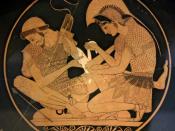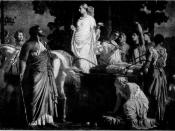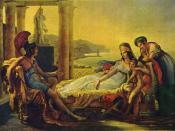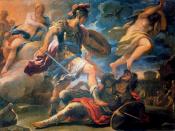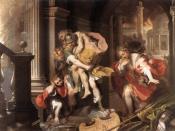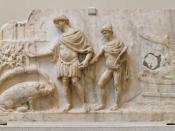"Oprah, Uma. Uma, Oprah."1 "Homer, Virgil. Virgil, Homer." The Aeneid, the greatest Latin epic of the battles and wanderings of the Trojan hero, Aeneas, and his founding of the ruling line for the Roman Empire was written by the great Latin poet Virgil. Or so it seems. When one is reading the Aeneid and has also read both Homeric epics, one can almost instantly see many parallels between Homer and Virgil. Not only are there parallels in the actual style of writing, but the most prominent parallels come in the aspects of structure, events, and characterization.
The Aeneid is, in actuality, "... a structural and thematic reworking of both epics of Homer."2 The Aeneid is clearly modeled in the beginning after the Odyssey while in the end it is modeled after the Iliad. The happenings and actions of Aeneas are very similar to both those of Odysseus and later of Achilles.
Many of the characters themselves are also modeled after Homer's characters. There are also many little details here and there which show that Virgil certainly modeled his epic after Homer, not to plagiarize, but for the style and the use of a model for human insight and feeling. When reading the Aeneid, one can clearly see and hear the Homeric echoes present in the epic.
The Aeneid is clearly divided into two parts, "The 'Odyssean' Aeneid"3 and, "The 'Iliadic' Aeneid."4 The first six books are based on the Odyssey while the last six books are based on the Iliad. To clearly see that Virgil was indeed basing his working on Homer, let us examine the Homeric echoes that are present in the first half, or the Odyssean Aeneid. The first parallel that presents itself is the immediate situation of Aeneas and his ships. Just as Odysseus and his crew were lost after the end of the Trojan War, so too are Aeneas and his crew. Just like Odysseus was battered by a storm and almost killed after leaving Calypso's island5, so too are Aeneas' ships being battered by a storm set on by Juno. The general situation is the clear parallel, however. Not only the storm, but the fact that Aeneas and his ships are wandering lost for many years and at the mercy of a vengeful god, and the fact that they will eventually land on a friendly shore just like Odysseus landed on the Phaeacian shore6, is almost an exact replica of Odysseus' situation in the Odyssey. When Aeneas arrives on Carthaginian soil, he, just like Odysseus did when he arrived in Phaeacia7, tells the story of how he arrived and under what circumstances8 both told in rousing flashbacks. Another similarity to the Odyssey are the contests and games. While in the land of the Phaeacians, Odysseus participates in the contests there9, while Aeneas holds similar contests to honor the death of his father Anchises10. Just as Aeneas leaves the land of the Carthaginians, Dido places a curse on him similar to the one Polyphemus places on Odysseus when she says, "... I hope and pray that on some grinding reef/ Midway at sea you'll drink your punishment/ And call and call on Dido's name!"11 This leads to perhaps the most obvious parallel between the Odyssey and the Aeneid, the visits to the underworlds12. Just like in the Odyssey where Odysseus receives advice on how he should proceed to get himself home, here too does Aeneas receive advice on how he should get to Italy and how he will have to fight a bloody war with the inhabitants there upon his arrival. Just as Odysseus meets the souls of people he knew, so too does Aeneas as he meets Dido, Palinurus, and his father Anchises. The fact that he does leave Carthage raises a very subtle echo between Homer and Virgil, the rejection of happiness or immediate luxury in exchange for the struggle for something much better. In the Odyssey, Odysseus rejects happiness and luxury with Nausicaa, Circe, and Calypso to struggle and perhaps even die to return home to his own wife.
So too does Aeneas reject happiness and luxury with Dido, even though he is truly in love with her, to struggle and wage war on a foreign land to found an empire for his future descendants.
Besides the Homeric echoes to the Odyssey, the last half of the Aeneid is an echo of Homer's Iliad. It is indeed after Book VI that Virgil turned, "... to the Iliad and modeled his last six books on Homer's tragic poem of war."13 The first obvious parallel here is the presence of a major war. In the Iliad the war is between the Greeks and the Trojans, while in the Aeneid, the battle is between the Trojans and the Latins led by Turnus. Both battles are reminiscent of each other as being fought by large enemies and being especially violent and gruesome. There is even a siege that occurs similar to the Greeks storming the city fortress of sacred Ilion when the Latins try to storm the Trojan ramparts. One obvious similarity is the calling of a truce and the choosing of the two champions to decide the war14. In the Iliad it is Paris and Menelaus who are to fight and decide the war while in the Aeneid it is Aeneas and Turnus. Both truces eventually end with a divinity causing someone to break the truce and wound one of the champions as an arrow wounds Menelaus and a spear wounds Aeneas. Another similarity is the death of the closest friend of the strongest hero. In the Iliad it is Patroclus' death that finally motivates Achilles to enter the war while in the Aeneid it is Pallas' death that causes Aeneas, even though he is already fighting in the war, to increase his vigor and enthusiasm for the fight. Aeneas, like Achilles, grieves heavily over the death of his close friend. One very interesting parallel between the Iliad and the Aeneid is the crafting of the shield for the hero15. Both shields represent various facets of the societies from which each warrior comes. Both are also crafted by the god of the forge: Vulcan, Hephaestus in the Greek. Another major echo from Homer in the Aeneid is the battle between Aeneas and Turnus. This battle is almost a reproduction of the epic fight between Achilles and Hector. Between Achilles and Hector, Achilles had to chase him around the city three times before Hector was finally stopped by Athena to do battle while in the Aeneid Turnus, "... Swifter than wind he fled,"16 is reminiscent of how Hector fled Achilles and he also, "... ran, weaving circles at a loss/ This way and that..."17 just like Hector. Aeneas too is just like Achilles who could not catch up with Hector as Aeneas, "... pressed on hotly, matching stride for stride,/ Behind his shaken foe."18 The way Turnus dies is even reminiscent of how Achilles kills Hector by letting him speak before he actually delivers the death blow while at his mercy.
Homer is also echoed in Virgil by the characters themselves. A close reading of the characters and the way they act reveals that they are in fact modeled on Homer's characters. The first character that is modeled on Homer is Aeneas. Aeneas is a combination of both Odysseus and Achilles. He is Odysseus in the way that he is trying to prevail against the wrath of a god and sail to a destination while being presented with struggles along the way such as storms, the Charybdis, and Polyphemus, all like Odysseus had to confront. Aeneas even has to go into the underworld like Odysseus did to receive advice and hear prophecy about his immediate future.
He is like Achilles in that he is the best warrior that the Trojans have and also like Achilles he is the son of a goddess. He also loses a close friend like Achilles does and is the one who slays the other army's champion after a chase and fight. The character of Turnus is based on Hector from the Iliad. Just like Hector, he is defending his land against invaders and what he sees as a threat to his entire way of life. Just like Hector who dies in the fight for his city, so too does Turnus.
They both die very similar deaths at the hands of the warrior heroes. Pallas is based on the character of Patroclus. Just like Patroclus to Achilles, so too was Pallas a good friend to the hero, in this case Aeneas. Unfortunately, also like Patroclus, he is killed in the heat of battle by the enemy's champion, Pallas in his haste to join war at a young age, while Patroclus' haste was going too far up in the ranks of the Greeks to fight the Trojans. Even Aeneas' son Ascanius or Iulus is based upon the Telemachus that Homer based his Telemachus on, the young boy unable as yet to go to war, but idolizing and worshipping his father as the ideal warrior. The gods are also based on each other. While in the Odyssey it is Poseidon who causes all the trouble for Odysseus, in the Aeneid, it is Juno who causes much the same trouble for Aeneas as well.
Clearly Virgil is imitating Homer's wrath theme from the Iliad and the Odyssey. There is also a parallel between Dido and the women in Homer. Both women in Homer, Helen and Penelope, are strong minded and loyal, so too is Dido. Also, the warrior princess in Book XI could also be tribute to the strong women of Homer. Even the Trojans themselves have reversed role with the Greeks of the Iliad as they are now seen as the invaders.
In the Aeneid, Virgil has many parallels to Homer. These echoes range from characters to plot to the structure itself. Virgil uses the style and devices of Homer as a tool for not only telling a rousing epic about the founding of Rome, but also as a tool for probing into the human soul and conveying the human condition to the reader. Some of these echoes include the wanderings of Aeneas, the massive battle between the Trojans and the Latins, and some of the characters such as Aeneas being both Achilles and Odysseus. The Aeneid, was written as a Roman story about the founding of Rome and its ruling line, and thus one would not suspect that there would be any parallels to a Greek epic of fiction, but indeed in the Aeneid, there are many parallels or echoes to Homer.
BIBLIOGRAPHY Bloom, Harold. Homer's Iliad. Pennsylvania: Chelsea House Publishers, 1996.
. Homer's Odyssey. Pennsylvania: Chelsea House Publishers, 1996.
. Virgil's Aeneid. Pennsylvania: Chelsea House Publishers, 1996.
Gransden, K.W. Virgil, The Aeneid. Cambridge: Cambridge University Press, 1990.
Virgil. The Aeneid. trans. Robert Fitzgerald. New York: Vintage Classics, 1990.
